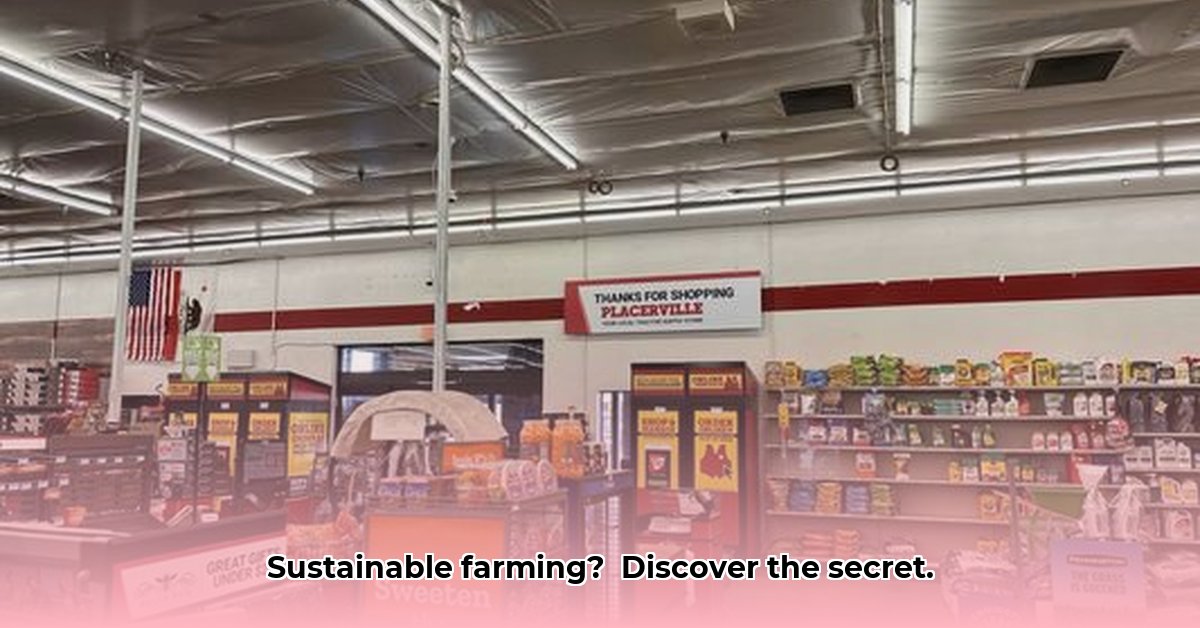
Placerville, California's agricultural landscape is a blend of small, bio-intensive farms and larger, established operations. This dynamic environment presents both opportunities and challenges for sustainable agriculture, and Tractor Supply's role within this ecosystem warrants closer examination. How does the store contribute to the adoption of eco-friendly farming practices? This article explores that question, highlighting what we know, what remains unknown, and essential steps for a more sustainable future. For more information on the Placerville store, visit Tractor Supply Placerville.
Access and Convenience: A Foundation for Sustainable Practices
Tractor Supply's strategic location in Placerville offers a significant advantage to local farmers. Its proximity to many farms and ranches in the surrounding areas, including Garden Valley, Coloma, and Shingle Springs, ensures convenient access to essential supplies. This ease of access can significantly impact farmers' decisions, potentially making the choice to adopt more sustainable practices simpler. Need organic fertilizer at the last minute? A nearby Tractor Supply makes that possible. The store’s close proximity to the Caltrans Placerville Maintenance Station also ensures reliable road access for efficient transport of agricultural products.
However, convenience alone doesn't guarantee sustainability. The critical question remains: What exactly does Tractor Supply offer in terms of eco-friendly products? Does the store stock a substantial selection of organic seeds, water-saving irrigation systems, and other sustainable agricultural supplies? A thorough inventory analysis is crucial to answer this.
Unveiling the Impact: Data Gaps and Future Research
While the potential for positive impact is evident, a comprehensive understanding of Tractor Supply's role requires more data-driven analysis. Currently, we lack specific figures on the proportion of their inventory dedicated to environmentally friendly items. What percentage of their sales are organic farming supplies? What about water conservation equipment? This information gap hinders a precise evaluation of their contribution to sustainable agriculture.
Several scenarios are plausible. Perhaps Tractor Supply actively promotes sustainable products but needs to increase their visibility. Or, perhaps, the demand for such products isn't yet high enough to warrant a larger selection. Further research, possibly including sales data analysis and surveys of local farmers’ purchasing habits, would provide crucial insights. This investigation should be driven by the larger goal of understanding whether Tractor Supply is a significant catalyst, or a more minor participant, in fostering sustainable change.
Charting a Course to Sustainability: Actionable Steps
To truly advance sustainable agriculture in Placerville, a collaborative approach is essential. This requires concerted action from multiple stakeholders, including Tractor Supply, local farmers, the El Dorado County government, and agricultural researchers.
Table 1: Collaborative Steps for Sustainable Agriculture in Placerville
| Stakeholder | Short-Term Actions (0-1 Year) | Long-Term Actions (3-5 Years) |
|---|---|---|
| Tractor Supply | Conduct a detailed inventory analysis of sustainable products; publicly share findings. | Partner with local organic farms; host workshops on sustainable practices; create a dedicated "Green Section" in-store. |
| Local Farmers | Prioritize sustainable products; provide feedback to Tractor Supply on product needs. | Explore cooperative purchasing; advocate for more sustainable options from Tractor Supply. |
| El Dorado County Government/Agencies | Offer incentives (e.g., tax breaks) for sustainable farming; support farmers' markets. | Invest in research on water-efficient irrigation; develop educational resources for farmers. |
| Researchers & Environmental Groups | Conduct independent assessments of Tractor Supply's ecological impact. | Conduct ongoing monitoring of sustainability initiatives; share best practices. |
Does Tractor Supply's current inventory reflect a true commitment to ecological stewardship, or is there room for substantial improvement? A data-driven response to this question is vital.
Conclusion: A Collaborative Journey
While the potential benefits of Tractor Supply's presence are clear, a definitive assessment of their contribution to sustainable agriculture in Placerville requires further research. This includes a detailed inventory analysis, sales data examination, and an assessment of the store's influence on the buying habits of local farmers. The path towards sustainability requires cooperation among all stakeholders, ensuring a thriving agricultural sector in Placerville while preserving the region’s environmental resources. Only through collaborative efforts can we achieve a truly sustainable future.